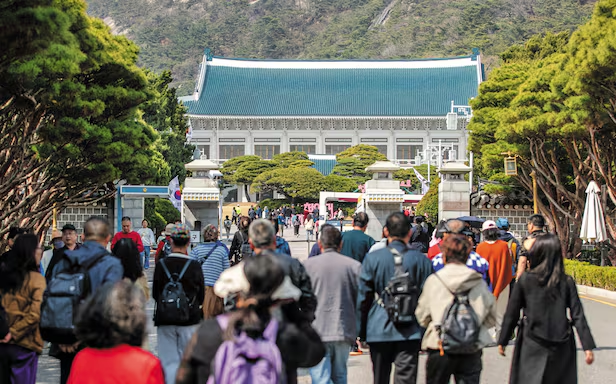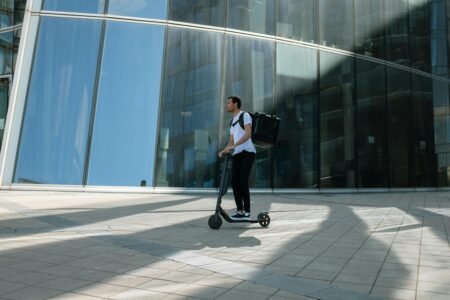Visitor numbers to Cheong Wa Dae, also known as the Blue House, have spiked since the impeachment of South Korean President Yoon Suk-yeol. On Monday, April 7, the first weekday following the Constitutional Court’s ruling, thousands gathered at the former presidential compound to witness the site during a key political moment.
More than 15,000 people visited over the weekend, April 5 and 6, immediately after the court’s decision. By Monday afternoon, lines stretched nearly 150 meters in front of the main building. Cheong Wa Dae, once the nation’s center of power, is now a public site under the Ministry of Culture, Sports and Tourism.
Historic Grounds Draw Families and Tourists
At Sangchunjae, a traditional Korean hanok known for its peaceful gardens, families and young couples lined up to take photos. Many pushed strollers and wandered slowly through the paths, enjoying the spring atmosphere.
Nearby, Nokjiwon Garden had burst into bloom. Over 120 types of trees, including ancient pines and scholar trees planted by past presidents, stood in full spring display. Cherry blossoms and apricot flowers added soft colors of pink and white, creating a striking backdrop for photos.
The rising number of visitors reflects more than seasonal interest. The impeachment decision and the coming snap presidential election in June have turned Cheong Wa Dae into a symbolic space, sparking public reflection and political conversation.
Visitors Driven by Urgency and Uncertainty
Many visitors say they rushed to see the Blue House before potential changes to its role or access policies. Lee Hyo-min, 44, traveled from Gimpo, Gyeonggi Province, with his wife on a day off.
“We’d been meaning to come, but the election made it feel urgent,” he said. “We’re not sure how long it will stay open, and now that we’ve seen it, it’s even more beautiful than we expected.”
The Blue House reopened to the public in 2022 after President Yoon moved the presidential office to Yongsan, breaking with decades of tradition. Since then, it has become a cultural and historic site visited by both locals and international tourists.
But with Yoon’s impeachment and a new president expected soon, debates are resurfacing over where the next administration should be based.
Debate Over Future Presidential Office
The upcoming June election has sparked a heated debate in political circles about the location of South Korea’s presidential office. There are three main options under discussion:
- Keep the current office in Yongsan.
- Return the presidency to Cheong Wa Dae.
- Move it to the administrative city of Sejong.
Each option carries political, financial, and symbolic weight. Cheong Wa Dae’s popularity in recent days is adding public pressure to the debate. Political experts say that the shortened campaign period makes the decision even more urgent.
“The Blue House is not just a building—it’s a powerful national symbol,” said Prof. Kim Ji-hyun, a political analyst at Seoul National University. “Its future use will reflect the values and direction of the next government.”
Visitor Numbers Triple Since Ruling
According to the Cheong Wa Dae Foundation, which oversees operations at the site, visitor numbers have more than tripled since the impeachment was announced.
“Before the court’s decision, we welcomed around 3,000 visitors a day,” said a foundation official. “Now, we’re seeing over 10,000 daily. Interest has exploded.”
The Ministry of Culture, Sports and Tourism is now considering extending opening hours and adding staff to manage the crowds. Online reservations for guided tours have also increased, with many time slots fully booked.
Cultural Significance in Times of Change
Cheong Wa Dae is more than a former workplace for presidents. It represents decades of South Korean history, including major political decisions, state visits, and national ceremonies. As the country navigates a leadership transition, the site is becoming a place for public memory and national reflection.
Tourists are also playing a role in boosting the local economy. Nearby restaurants, souvenir shops, and cafes have reported increased business since the weekend surge. Local vendors hope the interest continues through the election period.







